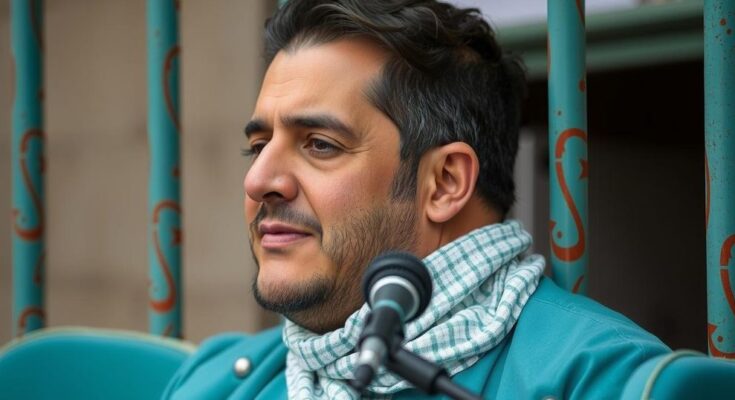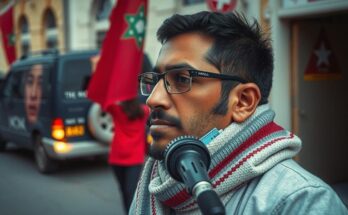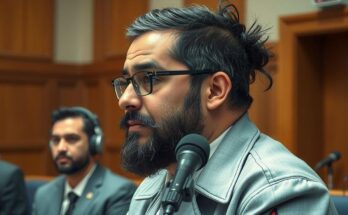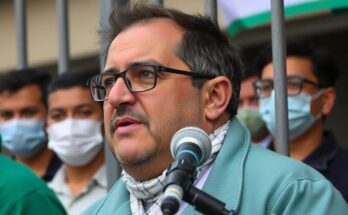Said Ait Mahdi, a Moroccan activist, was sentenced to three months in prison and fined over $1,000 for his role in protests regarding the government’s response to a devastating earthquake. His conviction has been condemned by human rights advocates as politically motivated, reflecting concerns over civil liberties in Morocco amidst recovery efforts for the earthquake’s victims.
Said Ait Mahdi, a prominent Moroccan activist, faced sentencing following his leadership in protests against the government’s earthquake response. The court imposed a three-month prison term alongside restitution of over $1,000. Ait Mahdi, aged 32, who leads a significant activist organization in the quake-impacted region, encountered charges including defamation, assault, and inciting unauthorized demonstrations. His prosecution is regarded by human rights groups as politically motivated and arbitrary.
The September 2023 earthquake, which struck with a magnitude of 6.8, resulted in nearly 3,000 fatalities and widespread destruction across the Al Haouz region. The earthquake destroyed numerous homes, schools, and health centers and rendered essential mountain roads impassable. Ait Mahdi’s sentencing marks him as the first activist in this region to receive such a punishment amidst growing discontent about the recovery efforts, with many citizens still residing in temporary accommodations.
Defending attorney Isaac Charia noted that although typical sentencing for similar charges could amount to one year, the three-month sentence was less severe than anticipated. Following Ait Mahdi’s trial, three other activists with comparable charges were acquitted. Civil liberties organizations criticized his detention, identifying it as a retaliatory measure against his advocacy for the victims of the earthquake.
The Moroccan Association for Human Rights condemned Ait Mahdi’s arrest, labeling it arbitrary and asserting that it was a consequence of his activism. A coalition of NGOs and leftist political groups similarly indicated that the legal actions against him were attempts to distract from the grave violations experienced by victims due to the government’s inadequate earthquake response.
The natural disaster has intensified longstanding social inequalities affecting Morocco’s indigenous minority groups. It caused significant damage to over 60,000 homes and at least 585 schools, according to official estimates. The government has committed over $11.5 billion for recovery and reconstruction initiatives over the coming five years, aiming to restore homes and provide monetary assistance to displaced families.
Activists have initiated protests in various cities, including major demonstrations organized by the Civil Coalition of the Mountain in Rabat to highlight delays in reconstruction efforts, notably occurring 16 months post-earthquake. These groups have consistently recognized Ait Mahdi as a vital advocate for the marginalized and earthquake victims, with substantial public support evident during his trial in Marrakech.
The topic centers on the political and social implications surrounding the trial and sentencing of Said Ait Mahdi, a Moroccan activist. The context involves significant distress among citizens in earthquake-affected regions of Morocco, where recovery efforts have been deemed inadequate. The sentencing of Ait Mahdi is seen as a suppression of dissent and a reflection of governmental strategies to silence criticism related to disaster management. This situation is emblematic of broader issues of civil liberties and human rights in Morocco, particularly concerning activists who challenge governmental actions.
In conclusion, Said Ait Mahdi’s conviction highlights the contentious relationship between the Moroccan government and civil society, particularly in the wake of the devastating earthquake. His case underscores not only the challenges faced by activists within authoritarian contexts but also the urgent need for accountability in governmental disaster response efforts. The public’s ongoing demand for justice and transparency signals a critical juncture in Morocco’s civil landscape, where the call for human rights must not be ignored.
Original Source: www.thecanadianpressnews.ca




